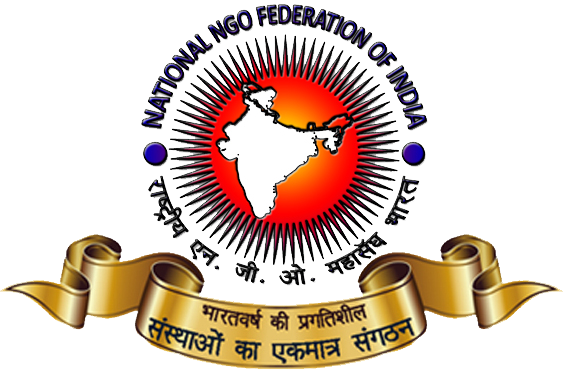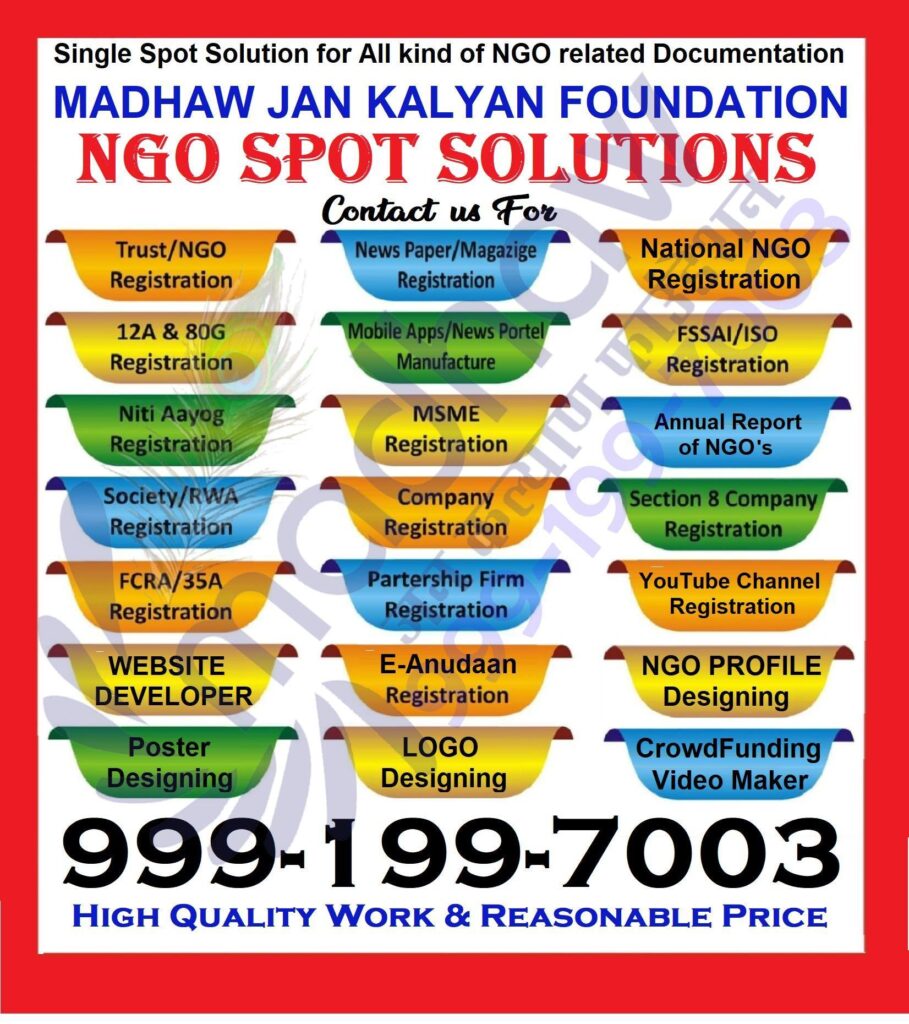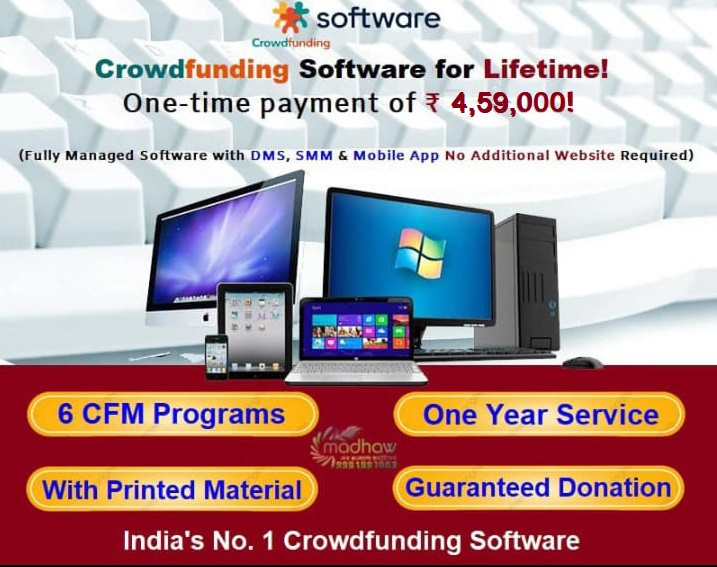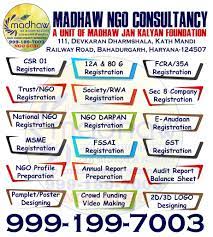NGO Registration
- NGO Registration
- Difference in Company, Society and Trust
- How to Start NGO – Form, Register and Run NGO
- Why to Register NGO
- How to run and manage NGO?
- Society Registration
- Society Registration Process and Procedure
- Name Change Process for Society
- How to Register NGO
- Societies Registration Act, 1860
- Public Charitable trust
- Registration Process of Public Charitable Trust
- After Registering the Public Charitable Trust
- Section 8 Non Profit Company Registration
NGO Resources
- NGO Resources
- NGO & Government of India
- NGO Partnership Registration
- Relations of NGOs with Business and Commerce
- Public Grievances Resolution related to Government
- Social Calendar
- NGO Management
- NGO Support
- What is NGO
- Voluntary Organisations and Volunteerism
- NGOs : Classification, Definitions, Typologies and Networks
- Understanding NGOs
- Can any Government Employee or Officer be the member of NGO?
- Income Exemption u/s 35AC Revoked
- Aims, Objectives & Programmes for NGO
NGO Funding & Grants
- NGO Funding
- Fundraising
- Funding and Grant Schemes
- Govt Schemes
- How to raise Funds for NGO
- Project Proposal Process
- Fundraising Ideas and Concepts
- Funding Agencies
- CSR Funding Empanelment by National CSR Hub
- CSR Funds through Corporate
- CSR Policy, Rules, Regulations and Guidelines of Government
- Government Funding Ministries
- International Funding Agencies
- Google for Nonprofits
- Fellowship
- CSR Funding
- Fund Raising
- Government Funding
- Grant Proposal for NGO Writing Preparation Process
- Project Proposals
Indian Non-Profits
- Andaman Nicobar
- Arunachal Pradesh
- Andhra Pradesh
- Assam
- Bihar
- Chandigarh
- Chhattisgarh
- Dadra Nagar Haveli
- Daman and Diu
- Delhi
- Goa
- Gujarat
- Haryana
- Himachal Pradesh
- Jammu Kashmir
- Jharkhand
- Ladakh
- Karnataka
- Kerala
- Lakshadweep
- Madhya Pradesh
- Maharashtra
- Manipur
- Meghalaya
- Mizoram
- Mumbai
- Nagaland
- Orissa
- Pondicherry
- Punjab
- Rajasthan
- Sikkim
- Tamil Nadu
- Telangana
- Tripura
- Uttar Pradesh
- Uttarakhand
- West Bengal
Role of NGO in RTI

What NGO can play and perform its role in Tight to Information.
Right to information Act, 2005 and the Role of NGOs, CSOs etc.
Role of NGOs, CSOs etc.:
Participation in governance is at the heart of any successful democracy. As citizens, we need to participate not only at the time of elections but on a day-to-day basis – when decisions on policy, laws and schemes are being made and projects and activities are being implemented. Public involvement not only enhances the quality of governance but also promotes transparency and accountability in government functioning. But in reality how can citizens take part in governance? How can the public understand how decisions are being made? How can ordinary people find out how tax money is being spent or if public schemes are being properly run or whether the government is acting honestly and fairly when it makes decisions? How can government servants be made answerable to the public they are supposed to serve?
One way of participating is by exercising the right to access information from bodies which spend public money or perform public services. Following the enactment of the Right to Information Act 2005 (RTI Act) in May 2005, all citizens of India now have the RIGHT to access information. The RTI Act recognises that in a democracy like India, all information held by government ultimately belongs to the people. Making information available to citizens is simply a part of normal government functioning because the public have a right to know what public officials do with their money and in their name.
What is Social Audit?
Social Audit is an independent and participatory evaluation of the performance of a public agency or a programme or scheme. It is an instrument of social accountability whereby an in-depth scrutiny and analysis of working of a public authority vis-à-vis its social responsibility can be undertaken. It also enables the Civil Society to assess whether a public authority lives up to the shared values and objectives it is committed to. It provides an assessment of the impact of a public authority’s non-financial objectives through systematic and regular monitoring based on the views of its stakeholders.
Benefits of Social Audit
The primary benefits of Social Audit are:
- Complete transparency: In the process of administration and decision-making, Social Audit ensures an obligation on part of the Government to provide full access to all relevant information.
- Rights Based Entitlement: Social Audit propagates rights-based entitlements for all the affected persons (and not just their representatives) to participate in the process of decision making and validation.
- Informed Consent: Social Audit provides for the right of the affected persons to give informed consent, as a group or as individuals, as appropriate.
- Immediate Answerability: Social Audit enables swift and prompt response by the elected representatives and Government functionaries, on their relevant actions or inactions, to the concerned
- Speedy Redressal of Grievances: Social Audit ensures speedy redressal of grievances of the affected people by the public
Using the RTI Act, NGOs and CSOs, therefore, can facilitate social audits of government processes, activities, programmes, schemes etc., and help improve public service delivery and the efficacy and accountability of public officials. They can use the RTI Act to inspect various processes, programmes and schemes of any public authority. They can even examine the works undertaken by any Government Department at any stage and draw samples of materials that are in use. NGOs and CSOs can also collect and verify records, documents and samples of particular works undertaken by the Government. The following sections help illustrate how RTI can be used to access information and enable social audit of processes, programmes and schemes so as to improve public service delivery and enhance accountability of public officials. However, it needs to be noted that the illustrations given below are selective and are meant for guiding NGOs and CSOs to access specific information that could be used to undertake Social Audits.
To play an integral part in bringing about a practical regime transparent and accountable in governance, NGOs and CSOs may undertake the following:
- First, to gather information and undertake research that forms the basis of campaign that civil society organisations
- Second, NGOs and CSOs must actually use the legislation – especially in the early days. And requesters must be assertive demanding good service under the law. The experience of freedom of information the world over tells us that the early few years are crucial in determining habits – on both demand and supply sides. After that, systems are created, and norms and habits are established.
- Thirdly, they must encourage Government towards a “right to know” approach in other words, to encourage government to automatically publish the majority of its
- Fourthly, they will need to be vigilant to keep track of exemptions, time delays, updating of publication suo motu by authorities to ensure that the state does not negate the positive impact of RTI.
- Fifth, CSOs will need to find both champions – in government and in the private sector – and strategic partners, from the specialist civil society sectors, the media
- Finally, CSOs will need to work together, to promote better and more effective use of the Act by the
The greatest challenge does not lie in making the legislation work and to penetrate age-old walls of secrecy, but in accurately identifying the information that the different communities need in order to bring about social and economic development. NGOs and CSOs must then act as a bridge to elicit information, using the new law that will serve the interests of the weak and the poor, because inequality of access to information reflects a deeper inequality of power. If civil society is active, then the RTI Act will be a useful instrument in the fight for social justice.
In realising the objectives of the RTI Act, the role of NGOs and CSOs assumes considerable importance. As an important actor in the governance process and as a bridge between the community and public agencies, NGOs and CSOs can not only play an important role in monitoring public service delivery by invoking provisions under the RTI Act but also in generating awareness and building capacity among the community on RTI.
Role of Media in RTI:
Information is power and is regarded as the oxygen of democracy. If people do not know what is happening in their society, if the actions of those who rule them are hidden, then they cannot take a
meaningful part in the affairs of the society. Freedom of expression, free dissemination of ideas and access to information are vital to the functioning of a democratic government. Information is crucial for a vibrant democracy and good governance as it reflects and captures Government activities and processes. Access to information not only facilitates active participation of the people in the democratic governance process, but also promotes openness, transparency and accountability in administration. ‘Right to Information’ (RTI), the right of every citizen to access information held by or under the control of public authorities, can thus be an effective tool for ushering in good governance.
Transparency means that decisions are taken openly and enforced as per rules and regulations. It requires that information is freely available and directly accessible to those who will be affected by such decisions and their enforcement. It also means that enough information is provided to all the stakeholders in easily understandable forms and media to enable their meaningful participation in decision making processes. Accountability means that public institutions and functionaries are answerable to the people and to their institutional stakeholders. Accountability cannot be enforced without a regime of transparency.
A direct relationship exists between right to Information, informed citizenry and good governance. The Right to Information provides citizens the opportunity of being informed of what the Government does for them, why and how it does it. Public participation in Government, respect for the rule of law, freedom of expression and association, transparency and accountability, responsiveness, equity and inclusiveness, effectiveness, efficiency, accountability, strategic vision and consensus- orientation, legitimacy of Government, and the like, which are the core values of good governance, can be realised only if the right to information is implemented in the right spirit. Right to information is the hallmark of good governance.
The media can make a real difference to the lives of poor and disadvantaged people by:making people more aware of their rights and entitlements;
- enabling people to have access to government programmes, schemes and benefits;
- making people more aware of political issues and options and helping to stimulate debate;
- educating the public on social, economic and environmental issues;
- drawing attention to institutional failings – corruption, fraud, waste, inefficiency, cronyism, nepotism, abuse of power and the like;
- fostering exchange of best practices, knowledge resources, access to better technology, and to better choices;
- creating pressure for improved government performance, accountability and quality, for example in service delivery; and
- providing a discursive space for citizens to dialogue with other actors in the governance process.
The three main areas through which the media can make a significant impact on development and poverty reduction are:
- Empowerment
Media has a definite role to play in the empowerment of citizens. It gives voice to the needs and aspirations of the people and provides them access to relevant information. When people lack a voice in the public arena, or access to information on issues that affect their lives, and if their concerns are not reasonably reflected in the public domain, their capacity to participate in democratic processes is undermined.
Media, in all its varied forms, has opened up the potential for new forms of participation. The access to information and accessibility of information has increased with growth of print and electronic media and the Internet. Thus, the vulnerable and marginalized sections of the society such as the poor, women, weaker sections and socially disadvantaged are also using the media to make their voices heard.
- Social Awareness & Action
The media can be effective in not only preserving freedom but also extending it. The news media plays a decisive role in establishing a discursive space for public deliberations over social issues. The formative influence of the media on public attitudes, thoughts and perceptions is fundamental to the process of citizen engagement in public dialogue. Giving a voice to the poor also entails giving the poor people adequate opportunities to take initiatives for overcoming their problems. The media, through its role in shaping public awareness and action, can be a critical factor in facilitating sustainable development and poverty reduction.
- Good Governance
Good governance is recognized as central to poverty eradication, and a free media is a necessary condition for good governance. As an information conduit between corporations, government, and the populace, the media acts as a watchdog against government malfeasance, while at the same time fostering greater transparency and accountability. The media monitors public service delivery and reports on key issues to the public at large, and in this process exerts pressure on public service providers. By highlighting institutional failings to guard against and institutional successes for replication, the media creates the right framework of incentives for good governance.
- Catalyzing Effective Implementation of the Act
- Providing Information to the Citizens and Building Awareness on the Act:
- Giving Voice to the Citizens
- Acting as a Watchdog on behalf of the Citizens
- Reporting Social Audit
The following section provides cues for the media to use the RTI Act in discharging the following roles:
- In monitoring implementation of the Act
- In reporting on the effectiveness & efficiency of public service delivery
- In highlighting corruption and fraud related issues
- In highlighting citizen grievances
- In highlighting significant cases or efforts made by organisations/individuals on
However, it needs to be noted that the suggested areas are selective and are provided only to guide the media to effectively use the RTI Act provisions.
Some suggestive areas:
Primary Health Services subject to exemptions under section 8(1)
- Attendance of medical officer and other staff in the PHC
- Field visits of the PHC staff
- Supervisory visits undertaken by other health officials
- Stock registers of medicines with dates of procurement, expiry dates of medicines
- Number of outpatients treated
- Maintenance of safety pits in the centre
- Number of surgeries conducted and their success rate
- Immunisation achieved as against the Action Plan
- Inspection of vaccines in the cold chain (refrigerators)
- Inspection of safety measures followed by the staff in regular medical treatment
- Maintenance of counterfoils on immunizations
- Inspection of other relevant registers
- Implementation of Citizen’s Charter
Primary Education subject to exemptions under section 8(1)
- Attendance of teachers (Teacher Attendance Registers)
- Attendance of students (Pupil Attendance Registers)
- Teaching standards in the schools (Curriculum and daily lessons)
- Enrolment and drop-out rate of students (boys/girls)
- Academic performance of schools
- Implementation of Mid-Day Meal Programme
- Infrastructure standards in the schools (Class rooms, black boards, teaching aids, equipments, toilets – general and girls etc.)
Land Records
- Land title (Private ownership)
- Land allotted to institutions
- Details of lands under Government/trusts/temples/ department authorities
- Agriculture land records
- Forest land records
- Lands under public domain
- Details of persons who are in illegal possession of land and their status
- Lands acquired for rehabilitating communities/affected people
- Lands assigned to weaker sections, their development and use
Environmental Protection
- Details of forest and natural resources, endangered species
- Levels of environmental pollution
- Records relating to public safety and threshold levels of pollution
- Inspection of industrial units and trades that are potentially environment sensitive
- Environmental clearances
Public Works
- Contractual procedure
- Basis for decision to undertake this work
- Contract clauses for work monitoring & completion
- Status of work
- Work monitoring
- Copy of sketch of each work
- Inspection of work
- Samples of materials used in work undertaken
- Name of the work
- Work Order No
- Name of contractor
- Date of commencement
- Date of completion
- Rate at which work awarded
- Sanctioned amount
- Amount paid so far
- Head of account
- Copy of estimate of each work
- Design specifications/sketches
- Measurement books including record entries and abstract entries
- Check measurement extracts
- Quality control/third party inspection reports
Use of MP/MLA Local Area Development Scheme Funds
- Details of all the works awarded during the year out of the MP/MLA Constituency Development Fund:
- Name of work
- Brief Description of work
- Amount sanctioned
- Name of agency
- Date of sanction
- Date of work order
- Date of commencement
- Date of completion
- Rate at which work awarded
- Amount paid
- How much money was allotted to him during the current year and how much has been carried over from previous years?
- Out of the above, projects worth how much money have already been sanctioned?
- How many projects worth how much money are awaiting sanction?
- How much balance is left in the MP’s/MLA’s account?
Role: Highlight Corruption – related Issues
- Details of complaints of corruption received and the nature of allegations against each one of them subject to exemptions under section
- Copies of the complaints
- List of complaints that were closed without any investigation and
- List of complaints closed after investigation and copies of enquiry reports on the basis of which the complaints were closed.
- Cases where penal action has been initiated and details of penal action
- Cases where criminal complaints have been filed and their Cases that are pending and expected timeline for investigation to be completed
Role: Highlight Citizen Grievances
- List of all the grievances received from the public during the year or quarter and copies of the grievances.
- Action taken on each grievance
- Time limits for each grievance to be resolved as per rules/Citizen’s Charter
- Penalty prescribed against the officials if they do not adhere to these time limits
- Reasons for delay in resolution of the grievances Action taken against the officials in each case of delay
Role: Highlight significant Cases or Efforts made by Organisations, RTI Champions & Citizens
- Publicity stories on cases where citizens managed to access information revealing public inefficiency or corruption
- Publicity stories on successful appeals to Information Commission
- Publicity stories on cases where information was wrongly withheld by PIOs
- Publicity stories on specific decisions by Information
- Profiles of organizations promoting RTI
- Personality stories on Information Commissioners, prominent personalities and activists involved in the RTI campaign
- Write-ups on Right to Information in general
- Significant initiatives undertaken by civil society organizations and community based organizations
- Editorials
- Social Audit Case Studies
Other suggestive areas:
- National Rural Employment Guarantee Scheme
- Public Distribution System (PDS)
- Integrated Child Development (ICDS)
- Sanitation Services in a Particular Area
- Repair and Maintenance of Roads
- Corruption cases being handled by the Government
- Public grievances being handled by the Government etc.
(Source: http://ati.nagaland.gov.in)



